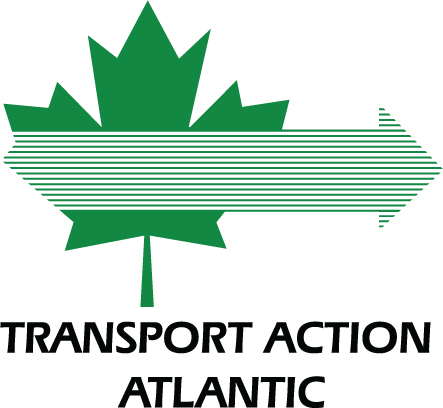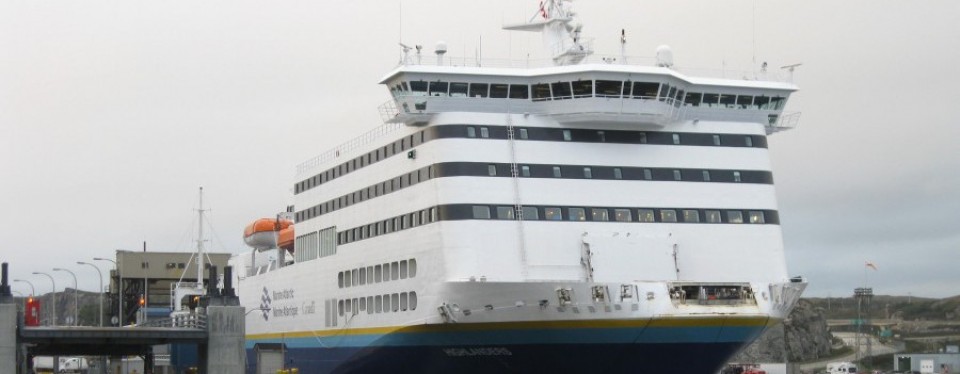Welcome to the March 2022 installment of Atlantic Transport News!
Here’s a look at what you’ll find in this edition:
- PEI takes green initiative against soaring fuel prices
- Maritime Bus owner encouraged after meeting with Transport Minister
- Saint John emphasizes transit in climate initiatives
- A busy summer expected for Marine Atlantic, with no rate increase so far
- Nova Scotia First Nation launches transit service
- BREAKING UPDATE: Long-awaited Chignecto Isthmus report released
PEI TAKES GREEN INITIATIVE AGAINST SOARING FUEL PRICES

Canada’s smallest province is leading the way in offering its residents a unique form of relief from rapidly escalating world-wide fuel prices. Instead of urging rebates or deferments of carbon taxes to give citizens a break, PEI Premier Dennis King is offering a climate-friendly alternative.
As part of a $20 million dollar fund to confront the rising cost of living, the Province of Prince Edward Island and T3 Transit have partnered to reduce the price of a monthly bus pass for islanders. Effective Monday, March 14, the cost of a public transit pass valid until the end of April will be $20 for adults and $10 for students (18+) and seniors. Everyone under 18 will ride for free during this period. The passes are valid on both T3 Transit in the provincial capital area and on the so-called “toonie transit” rural routes which currently extend from Souris and Montague west to Summerside. The rural initiative is expected to be extended westward to include service as far as Alberton and Tignish by mid-April.
“Right now, islanders are struggling with the increased cost of living and the unpredictable price of high fuel and heating oil,” Premier King said. “As a government we need to be there to help lessen the burden for islanders and help make life more affordable. This is a stressful time for everyone, and it is important that we ensure there are no additional barriers for islanders to get to work, school and the essential services they need.”
In another climate-friendly move, the PEI Government has announced a $100 point-of-sale rebate on bicycle purchases for a limited time. However, there’s concern that supply-chain issues may prevent many residents from taking advantage of the program. Bike retailers are urging government to consider extending the program until inventories recover.
MARITIME BUS OWNER ENCOURAGED AFTER MEETING WITH TRANSPORT MINISTER

(Image from Twitter @OmarAlghabra)
After many months of trying to get his message through to the top about the need for a helping hand to the motorcoach industry, Mike Cassidy has at last had his persistence rewarded. The Maritime Bus owner recently won an opportunity for a face-to-face meeting with federal Transport Minister Omar Alghabra – and on his own turf, at that.
The minister, a frequent flyer in the world of social media, embarked on a well-publicized swing through Atlantic Canada in early March. Mr. Cassidy has been working closely with politicians of all stripes in the course of his “public transit on provincial highways” campaign, and several members of the Atlantic Liberal Caucus helped facilitate bringing Mr. Alghabra for a tour of the bus garage in downtown Halifax.
According to Infrastructure Canada, the Rural Transit Solutions Fund seeks to help Canadians living in rural and remote areas get around their communities more easily day-to-day and connect with nearby communities. The $250-milliion program was unveiled last year, but up to now Ottawa has insisted that only not-for-profit agencies qualify for the capital assistance it offers. That specifically excludes companies like Maritime Bus and DRL Coachlines in Newfoundland – despite the fact that both have been losing money by the busload over the past two years.
Mr. Cassidy was able to use the meeting opportunity to explain to the transport minister why this policy was unreasonable, and should be changed to allow struggling for-profit operators to acquire new equipment. He’s encouraged by Mr. Alghabra’s apparent awareness of the intercity bus issue, and believes that progress is being made and the dialogue will continue.
It now appears that the political will is there, he says, at least on the federal level. But because accessing funding is contingent on provincial participation, there’s still more work to be done. The program requires a three-way split, with Ottawa, the province, and the applicant each investing an equal share. Therefore it’s essential that the provinces come on board. For now, Mr. Cassidy is “laser focused” on the three Maritime provinces where he operates, but the model could easily apply in Newfoundland and Labrador, and elsewhere across Canada. There’s a demonstrated need, he believes, for an interconnected motorcoach network that can sustainably carry both people and parcels from coast to coast.
SAINT JOHN EMPHASIZES TRANSIT IN CLIMATE INITIATIVES

The City of Saint John says the New Brunswick government needs to recognize the important role public transportation can have in achieving greenhouse gas emission targets. In a submission to the five-year review of the Province’s Climate Change Action Plan, the City recommends the introduction of incentives to residents who use public transit. It’s music to the ears of transit commission chair Nick Cameron.
“It has taken a while for folks to realize just how much of an impact transportation has on our greenhouse gases,” he told the Telegraph-Journal, adding that transportation represents one of the highest sources of greenhouse gas emissions in New Brunswick. “We really need to make sure that transportation is part of our plans going forward. And although electric vehicles are certainly part of that solution, focus on public transit is a much more affordable and impactful solution.”
The commission sent a letter of support to supplement the City’s submission, detailing some initiatives currently underway, including exploring on-demand service to feed more heavily-travelled and frequent transit routes. A consultant has also been hired to examine various options for greening the system, including electric, hydrogen, or natural gas powered buses.
In a late development, the City of Saint John has written Premier Blaine Higgs urging him to buy into the federal government’s recently announced $750-million program to help municipal transit systems rebound from two years of low ridership during the COVID-19 pandemic. Matching provincial funding is a condition for municipal transit systems to get their share, and New Brunswick has shown considerable reluctance in the past toward participation in such initiatives. Premier Higgs once infamously remarked flippantly that “Fredericton doesn’t need a subway system.”
Mr. Cameron said getting access to a share of the federal money is crucial to helping Saint John Transit rebuild ridership. He told CBC News that annual ridership was now less than 1.2 million – down from over two million pre-pandemic. He’s concerned that the lost riders may have found other, less climate-friendly, means of transportation, and it may not be easy to win them back.
A BUSY SUMMER EXPECTED FOR MARINE ATLANTIC, WITH NO RATE INCREASE SO FAR

It looks like a busy summer lies ahead for Marine Atlantic ferries – and so far there’s been no announced increase in the controversial rate structure. Despite lingering uncertainty as to where COVID-19 will trend in the months ahead, the Crown corporation says its advance bookings between Newfoundland and Cape Breton to date are more than double those for the same period in pre-pandemic 2019. And, there’s an added incentive for travellers using the ferries from mid-May until the end of June, with off-peak savings of up to 22 percent on vehicle and passenger fares.
Marine Atlantic spokesman Darrell Mercer told VOCM News that about 8000 reservations were made for the summer period between January 1 and March 7, compared with just 3300 in the same time frame three years ago. He attributed the surge to pent-up demand and the Government of Newfoundland and Labrador’s Come Home Year 2022 promotion. Cabin accommodations on many overnight sailings between North Sydney and Port aux Basques in July are already sold out.
It’s still unclear if the federal government will insist that Marine Atlantic meet its 65% cost recovery target this year, but so far there’s been no general rate increase announced. In 2021 planned increases were rescinded just days after their April 1 effective date when Ottawa relented on the requirement, for reasons attributed to the pandemic.
Part of this is no doubt due to continued pressure from politicians and advocacy groups. Transport Action Atlantic has recently ramped up its campaign to have ferry rates reduced to the cost of travelling the equivalent distance by highway. TAA continues to insist that this was the intent of the 1949 Terms of Union, in order to shield residents of the province from the burden of the added transportation costs of the Cabot Strait crossing.
Meanwhile, the rapid escalation of fuel prices arising from the Russian invasion of Ukraine is unlikely to have an immediate effect on Marine Atlantic’s fuel surcharge. The company’s website says it purchases and stores large volumes of fuel in bulk, which protects customers against unpredictable price swings and consequent frequent fuel surcharge adjustments.
-All items above by Ted Bartlett
ESKASONI FIRST NATION LAUNCHES COMMUNITY-RUN TRANSIT SERVICE

Eskasoni First Nation, a Mi’kmaw community in Cape Breton NS, is home to Nova Scotia’s newest transit service, with the community run operation making its first runs on March 14, 2022. The band launched the transit service to provide transportation options for people needing to get around the community, as well as getting in to Sydney for shopping, medical appointments, and other needs.
The service consists of a door-to-door van service, operating by request, and a bus operating a fixed route through the community and in to Membertou and Sydney. Van trips cost $5 anywhere in Eskasoni ($10 return trip), while the fixed route is $10 one-way or $20 for a return trip. The service to Sydney includes stops at the Cape Breton Regional Hospital, the Sydney Shopping Centre, and the Mayflower Mall. The bus makes two round trips daily, once in the morning, and once later in the afternoon.
The two accessible vehicles purchased for the service, at a cost of $170,000, were paid for with the assistance of the provincial government, who contributed $110,000 of the cost, with the band paying the remainder. The agreement to purchase the vehicles was first announced early in 2021, but the service has only now gotten underway.
You can read more about the service by visiting the Eskasoni Transit Service’s Facebook page.
UPDATE: LONG-AWAITED CHIGNECTO ISTHMUS REPORT RELEASED
In our January newsletter, we reported on mounting frustrations about the delay of a long-awaited report on protecting the Chignecto Isthmus, and the critical rail and highway infrastructure that passes over it, from the effects of climate change and worsening flooding. Just after we put the current newsletter to bed, news broke that the report has been released.
In a news release on March 18, 2022, the study outcomes were summarized with three options:
- raising the existing dikes
- building new dikes
- raising the existing dikes and installing steel sheet pile walls at select locations.
“Work on the Chignecto Isthmus Climate Change Adaptation Engineering and Feasibility Study started in 2018, and collaboration between New Brunswick, Nova Scotia and the federal government was key to ensuring this vital economic link between both provinces remains protected,” said New Brunswick Transportation and Infrastructure Minister Jill Green. “Not only will this ensure the continuation of the trade corridor, but it should provide additional protection for residents in Sackville and surrounding areas.”
The provinces of Nova Scotia and New Brunswick will decide on a course of action after discussing these options with the federal government. The cost of each option ranges from about $190 million to more than $300 million.




